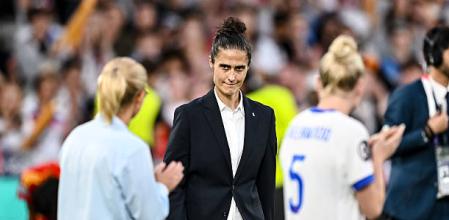The Royal Spanish Football Federation (RFEF) faces an immediate and critical challenge following the conclusion of the European Championship: securing the contract renewal of national team coach Montse Tomé. Despite the strategic importance of her leadership, an official announcement regarding her future remains conspicuously absent, raising concerns as her current agreement is set to expire on August 31.
This urgency is amplified by a demanding schedule of upcoming international competitions, including the highly anticipated Nations League finals, the 2027 World Cup in Brazil, and the qualification campaign for the 2029 European Championship. Tomé’s continuity is paramount for Spain to effectively navigate these significant challenges and build upon recent successes.
Sources close to the situation indicate that Tomé’s primary ambition is to remain at the helm of the Spanish national team. She is reportedly keen to further cultivate her distinctive playing philosophy and maintain the impressive momentum established under her guidance, a style characterized by attractive, possession-based football.
Spain’s ascent to the No. 1 position in the FIFA world rankings, set to be confirmed on August 7, underscores the team’s exceptional performance. Despite a narrow defeat in the European Championship final, the Spanish squad’s dominance throughout the tournament was undeniable, showcasing superior statistics and an unbeaten record in regulation time.
The team consistently led in all critical metrics, demonstrating not only an attractive and engaging style of play but also a profound collective understanding. This exceptional teamwork was further highlighted by the inclusion of four Spanish players—Aitana Bonmatí, Alexia Putellas, Irene Paredes, and Patri Guijarro—in UEFA’s prestigious Team of the Tournament.
The strong camaraderie within the squad is a frequently cited factor in their success, as articulated by goalkeeper Cata Coll in a candid interview with Mundo Deportivo. Her remarks, “We get along f—ing great. That matters a lot. You can really feel our connection on the field—it makes the game flow effortlessly,” encapsulate the deep bond that underpins their on-field cohesion and fluid play.
This cohesive environment also facilitates the seamless integration of emerging talent. A notable instance is the rapid incorporation of 19-year-old Lucía Corrales, who was called up as a replacement for the injured Laia Codina for the Nations League match against Belgium. Corrales made an impactful debut, contributing to Spain’s decisive 5–1 victory.
Looking ahead, Spain faces an immediate defense of their Nations League title. Their path to retaining the championship includes a challenging two-legged semifinal clash against Sweden, scheduled for October 24 and 28. These matches will serve as a crucial test of the team’s continued prowess and tactical adaptability.
Beyond the Nations League, the national team has its sights set on securing further major honors. The formidable task of defending their title at the 2027 World Cup in Brazil looms large, alongside the equally significant objective of successfully qualifying for the 2029 European Championship, solidifying Spain’s position at the pinnacle of international women’s football.






Leave a Reply